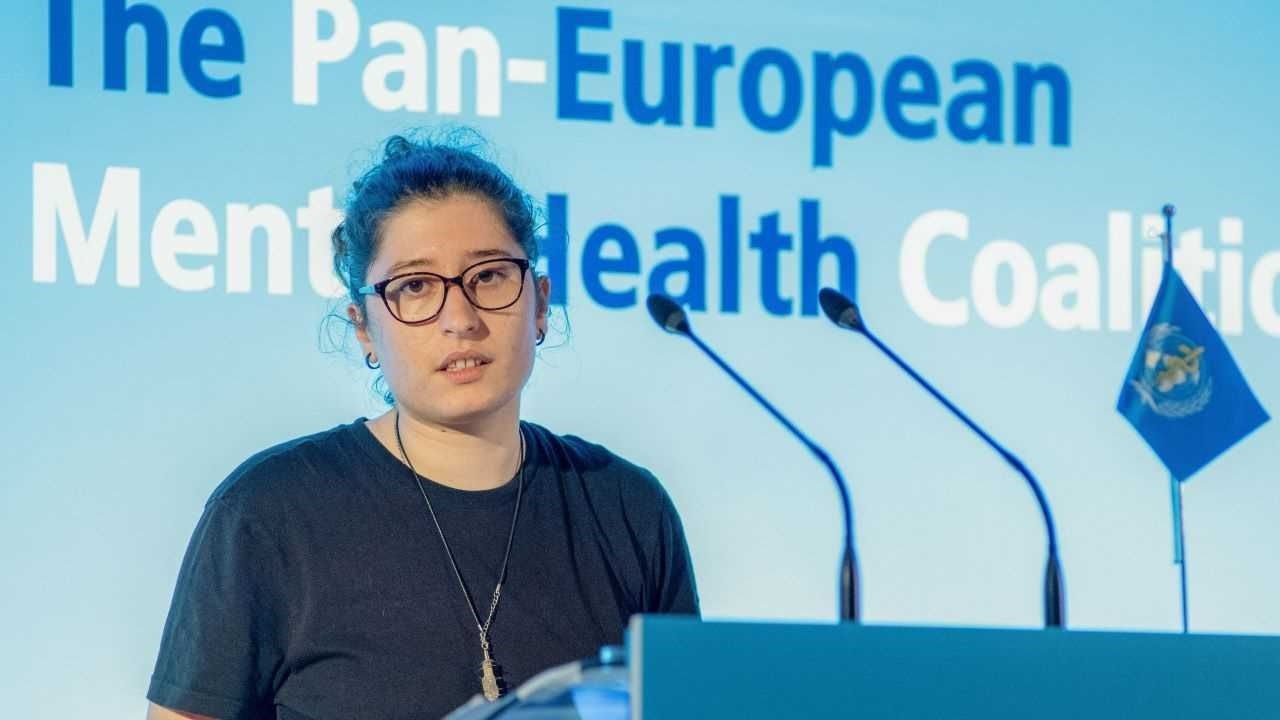Blog
Blog
Youth demand participation and change at first-ever Mental Health Week in Athens

“I feel very privileged to be here, but I shouldn’t feel that way. I should be able to feel comfortable and this shouldn’t be a privilege. It should be a norm,” said Inês Mália Sarmento, a young mental health advocate from Portugal, in her address to participants on the first day of Mental Health Week in Athens, Greece.
Mental Health Week, a joint initiative of WHO/Europe, through its Quality of Care Office in Athens, and the Government of Greece, was a special 3-day series of events from 3–5 November, meant to raise awareness about the mental health of children and youth in Greece and across the WHO European Region.
Inês was one of over 200 youth advocates and service users who joined experts and policy-makers at the event to demand equal partnership in shaping mental health policies and services and to create mental health systems that are inclusive and devoid of stigma and discrimination.
An open platform for reforming mental health services
Held at the Stavros Niarchos Foundation Cultural Centre in Athens, Mental Health Week engaged mental health service users and their families from many European countries, together with Greek ministers, mental health experts and Greek Olympic athletes, in a technical workshop, high-level meeting, and numerous arts and cultural activities.
Expectations for the event were high. “The series of events will provide us with an opportunity to discuss the current situation of mental health of children and adolescents and how we can ensure universal access to mental health services for young people in Europe,” said Zoe Rapti, Deputy Minister of Health of Greece.
Among the arts and cultural activities were yoga classes, a sailing course, a marketplace where service users of Greek mental health services sold food and handmade soap, and a concert featuring local musicians Monsieur Minimal and Andriana Babali and a disk jockey (DJ) set from Pepper Fm. The concert was opened by Olympic champion Nikolaos Kaklamanakis and Paralympic champion Dimitris Karypidis.
The goals of these events were to increase well-being and raise awareness of the stigma of mental health conditions, which has a substantial impact on many across the Region.
“I hid from society for 21 years out of shame for having a person with a mental health condition in my family. This had to change. No one, no family, should hide because of a mental illness,” said Katerina Nomidou, a mental health advocate from Greece.
Leaders are increasingly recognizing the need to improve mental health systems, especially in the face of crises, such as the COVID-19 pandemic, the war in Ukraine and a cost-of-living crisis, which “continue to add pressure on people’s lives and their mental well-being,” said Dr Hans Henri P. Kluge, WHO Regional Director for Europe, who joined the event live on the second day.
Young people have been especially affected, with the global prevalence of depression and anxiety disorders almost doubling since the pandemic began. There is an acute need to improve the quality of child and adolescent mental health services across the Region, making them not only more accessible but better suited to the unique needs and preferences of this age group.
For that reason, Dr Kluge added, Mental Health Week was timely and important. “In line with our Pan-European Mental Health Coalition and our European Programme of Work, and building on the Mental Health Summit we hosted together with our Greek partners back in July 2021, this event is part of an ongoing course of action that wants to create a world where young people can prosper,” he said. “For generations to come.”
Strengthening youth participation and the importance of lived experience
The first day of the events was dedicated to continuing the work of the Pan-European Mental Health Coalition, including a dedicated session for young people to discuss what good quality mental health services would look like in their particular contexts.
The young people were not shy in noting that they and those living with mental health conditions are often left out of this conversation. While people with lived experience of mental health conditions are increasingly involved in shaping mental health services and policies, participation is rarely prolonged and often lacks compensation.
“Lived experiences should be at the centre of all efforts. If it’s without us, then it’s not for us,” said Fatima Awil, a Policy and Knowledge Officer from Mental Health Europe with expertise in youth engagement.
“We are our own experts. We do a lot. I think young people do so much for their mental health, we are more aware than any other generation, but we can’t do it alone,” emphasized Anna Bailey, a PhD researcher and member of the Pan-European Mental Health Coalition.
The Pan-European Mental Health Coalition is another one of these spaces, and WHO/Europe encourages young people to join. Many young people who attended Mental Health Week have already done so, seeking a space where their voices will have real impact.








